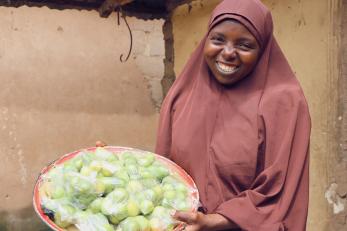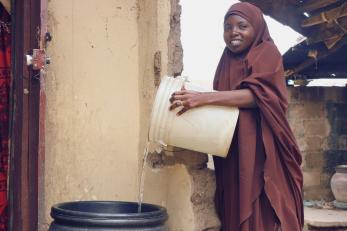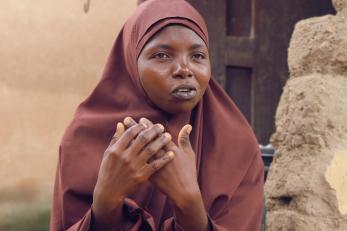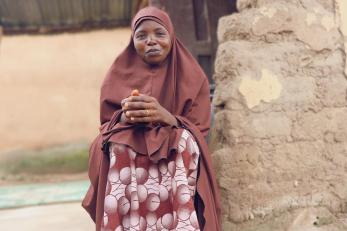Enriching lives and safeguarding health with clean water: Aisha Hamidu’s story

Aisha Hamidu, a dedicated fruit seller from the Wazri-Abo community, has experienced a remarkable transformation in her life and business thanks to the intervention of the Small Town Water, Sanitation, and Hygiene (STWASH) Activity. As a mother of five, she diligently adapts her fruit sales to meet market demand, focusing on selling in-season and high-demand fruits, such as oranges.
Previously, Aisha and her family had to rely on well water for drinking, cooking, and washing. During the dry season, they had to either buy water from vendors who fetched it from the river or endure a strenuous 50-minute to an hour-long trek to the river. The vendors sold water at the rate of five hundred naira per gallon. This stressful routine was not only time-consuming but also posed health risks, as the community frequently faced outbreaks of cholera and dysentery due to unclean water.

Aisha’s life changed when the USAID-funded Small Town WASH Activity intervened in Wazri-Abo, Adamawa State. The Activity identified the community through needs assessment and constructed a 50,000-liter capacity water borehole facility that now serves multiple points in the community where people can easily access clean water.
With this intervention, Aisha and other members of her community now have access to clean, fresh water for cooking and drinking. The water from the well is now reserved for washing clothes. Women like Aisha, who use water daily, have noticed how potable the borehole water is.
Reflecting on this transformation, Aisha happily shared, “The borehole has been a blessing for us. Before, we struggled with fetching water from distant sources, but now we have clean water right here in our community.”
Residents do not have to pay to fetch water from the borehole. They are only required to pay a maintenance fee of Thirty Naira, which they willingly do. Aisha emphasizes the importance of maintaining the borehole, viewing it as a shared responsibility.

Since the installation of the borehole, Aisha’s children have enjoyed better health, with fewer visits to the hospital. Clean water has significantly reduced cases of waterborne diseases in the community. “Since the installation of the water facility, my children have been healthier,” Aisha shares. “They have not had as many health issues, which has made a big difference for our family.”
The availability of clean water has boosted Aisha's fruit-selling business. She now washes her fruits with clean water, making them healthier for consumption. This has led to increased sales, as people prefer buying her well-packaged, hygienic fruits at the market.

“Using clean water has also improved my fruit-selling business,” Aisha adds. “I now wash my fruits with clean water, making them cleaner and more attractive to customers. This has helped increase my sales.”
Aisha dreams of seeing the water supply reach deeper parts of the community so everyone can benefit from the STWASH borehole. She hopes for the spread of this life-changing resource across different local government areas, enabling more people to experience the improved quality of life that clean water brings. The STWASH project has not only improved health and convenience but also empowered women like Aisha to enhance their livelihoods and support their families more effectively.
In Aisha's words, “Water has made life better for us.”
About STWASH
The Nigeria Small Town WASH Activity (STWASH) is a 5-year program funded by USAID and implemented by Mercy Corps in partnership with WaterAid in Borno, Yobe, Adamawa, Abia, Imo, and Delta States.
The program aims to strengthen the capacity and accountability of key institutions to provide and sustain access to water and sanitation services for 140,000 individuals in small towns across northeastern Nigeria.
The program will facilitate the economic recovery of crisis-affected communities and strengthen the capacity of state governments to provide essential WASH services while creating and sustaining an enabling environment for Small Towns Water Supply and Sanitation Agencies (STWSSAs) and Water Consumers Associations (WCAs) to operate.
The small towns where the program is being implemented include Mandara Abdu of Biu LGA, Wagini/Anguwan Baba Adamu of Shani LGA, and Kwaya of Kwayakusar LGA; Dumne of Song LGA, Vinikilang of Girei LGA, and Gangarasso-Sangassumi of Ganye LGA; Lailai of Potiskum LGA, and Kelluri of Geidam LGA.